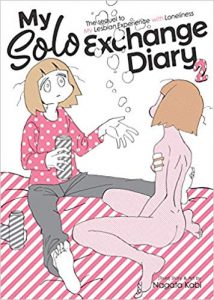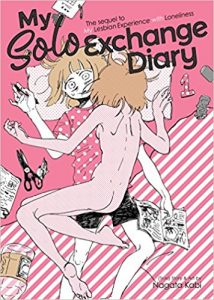By Nagata Kabi. Released in Japan as “Genjitsu Touhi Shitetara Boroboro ni Natta Hanashi ” by East Press, serialized in Matogrosso. Released in North America by Seven Seas. Translated by Jocelyne Allen. Adapted by Lianne Sentar.
If you have read the previous volumes of Nagata Kabi’s biographical examination of her past struggles, seeing the title and the cover art for this new book probably makes you think “Oh no.” But yes, once again life is not as simple as it seems, and recovery can be a path you walk on that might just lead you to a different wrong path. After dealing with mental and emotional struggles in My Lesbian Experience with Loneliness and My Solo Exchange Diary, and resolving to stop writing memoir-style manga (as she worries it makes her family and friends upset, which it does to an extent), a combination of adjusting to a lot of new medication and a lack of inspiration for fictional manga ideas have led her to stop by the ten bars that are between her house and the nearest station. The result? After intense stomach pain, she goes to the hospital to find she has acute pancreatitis – her reading is TEN TIMES what it should be. And so… she’s admitted to the hospital.
This takes place over a more compressed period of time than the previous volumes, focused very specifically on this point in her life. As you can imagine, a lot of it makes for uncomfortable reading, and going cold turkey on alcohol and fatty foods proves to be far more challenging than anyone can imagine. There’s also some excellent examination of medications and painkillers – the side effects that they can cause, the differences between them, and the depressing realization that some of these may need to be taken for the rest of her life. The hospital staff are very nice, but also seem to be nice in that “I am not personally involved with you” way, so it can come across ass a bit callous at times. There’s also a great discussion of alcoholism just before she’s discharged, as the doctor talking to her notes “Japanese people see alcohol as alcohol” – in other words, not as a drug, or something that could lead to alcoholism.
The other great part of this book is showing us Nagata Kabi’s determination to create new work, and how this can get so frustrating that, well, she can end up drinking herself into the hospital. Good things are happening to her – while there, she finds out that My Lesbian Experience with Loneliness won the Harvey Award – but this does not necessarily translate into ongoing creativity, as she has four partially completed projects with four different publishers, none of which are nearing completion. She’s also feeling tremendous guilt over how others are seeing her memoirs – not just her family, but a manga that she enjoys reading where the protagonist is told “don’t write about our life”. The trouble is… that’s what she excels at. A manga friend of hers urges her to stop pushing her brain to do things it doesn’t want to do and continue writing autobiographical memoirs. Even if it can be painful for all involved.
This is hopefully not the last we see from the author – a new memoir was just published in Japan three months ago. As with other books by this author, it can be difficult to read. But I enjoyed its look at struggling to accept that the body can crumble just as much as the mind can, and that recovery can be just as hard.



